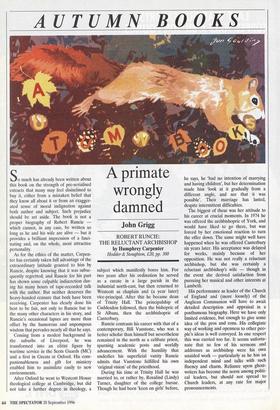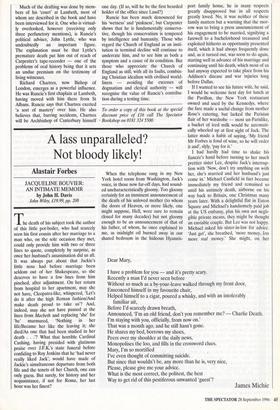AUTUMN BOOKS
A primate wrongly damned
John Grigg
ROBERT RUNCIE: THE RELUCTANT ARCHBISHOP by Humphrey Carpenter Hodder & Stoughton, f20, pp. 300
o much has already been written about this book on the strength of pre-serialised extracts that many may feel disinclined to buy it, either from a mistaken belief that they know all about it or from an exagger- ated sense of moral indignation against both author and subject. Such prejudice should be set aside. The book is not a proper biography of Robert Runcie which cannot, in any case, be written so long as he and his wife are alive — but it provides a brilliant impression of a fasci- nating and, on the whole, most attractive personality.
As for the ethics of the matter, Carpen- ter has certainly taken full advantage of the extraordinary latitude granted to him by Runcie, despite knowing that it was subse- quently regretted; and Runcie for his part has shown some culpable indiscretion dur- ing his many hours of tape-recorded talk with the author. But neither deserves the heavy-handed censure that both have been receiving. Carpenter has clearly done his best to be fair, not only to Runcie but to the many other characters in his story, and Runcie's occasional lapses are more than offset by the humorous and unpompous wisdom that pervades nearly all that he says. Coming from a modest background in the suburbs of Liverpool, he was transformed into an elitist figure by wartime service in the Scots Guards (MC) and a first in Greats at Oxford. His corn- panionableness and gift for mimicry enabled him to assimilate easily to new environments.
After Oxford he went to Westcott House theological college at Cambridge, but did not take a further degree in theology, a subject which manifestly bores him. For two years after his ordination he served as a curate in a large parish in the industrial north-east, but then returned to Westcott as chaplain and (a year later) vice-principal. After this he became dean of Trinity Hall. The principalship of Cuddesdon followed, then the bishopric of St Albans, then the archbishopric of Canterbury.
Runcie contrasts his career with that of a contemporary, Bill Vanstone, who was a better scholar than himself but nevertheless remained in the north as a celibate priest, spurning academic posts and worldly advancement. With the humility that underlies his superficial vanity Runcie admits that Vanstone fulfilled his own 'original vision' of the priesthood.
During his time at Trinity Hall he was married to, or rather by, Rosalind (Lindy) Turner, daughter of the college bursar. Though he had been 'keen on girls' before, he says, he 'had no intention of marrying and having children', but her determination made him 'look at it gradually from a different angle, and see that it was possible'. Their marriage has lasted, despite intermittent difficulties.
The biggest of these was her attitude to his career at crucial moments. In 1974 he was offered the archbishopric of York, and would have liked to go there, but was forced by her emotional reaction to turn the offer down. The same might well have happened when he was offered Canterbury six years later. His acceptance was delayed for weeks, mainly because of her opposition. He was not really a reluctant archbishop, but she was certainly a reluctant archbishop's wife — though in the event she derived satisfaction from pursuing her musical and other interests at Lambeth.
His performance as leader of the Church of England and (more loosely) of the Anglican Communion will have to await detailed description and appraisal in a posthumous biography. Here we have only limited evidence, but enough to give some idea of the pros and cons. His collegiate way of working and openness to other peo- ple's ideas is well conveyed. In one respect this was carried too far. It seems unfortu- nate that so few of his sermons and addresses as archbishop were his own unaided work — particularly as he has an independent mind and talks with such fluency and charm. Reliance upon ghost- writers has become the norm among politi- cal leaders, but should not spread to Church leaders, at any rate for major pronouncements.
Much of the drafting was done by mem- bers of his 'court' at Lambeth, most of whom are described in the book and have been interviewed for it. One who is virtual- ly overlooked, however (receiving only three perfunctory mentions), is Runcie's political adviser, John Lyttle, who was undoubtedly an important figure. The explanation must be that Lyttle's premature death put him out of reach of Carpenter's tape-recorder — one of the problems of oral history being that it sets an undue premium on the testimony of living witnesses.
Richard Chartres, now Bishop of London, emerges as a powerful influence. He was Runcie's first chaplain at Lambeth, having moved with him there from St Albans. Runcie says that Chartres exerted 'a sort of mastery' over him. He also believes that, barring accidents, Chartres will be Archbishop of Canterbury himself one day. (If so, will he be the first bearded holder of the office since Laud?) Runcie has been much denounced for his 'wetness' and 'pinkness', but Carpenter shows that he is fundamentally conserva- tive, though his conservatism is tempered by intelligence and humanity. Those who regard the Church of England as an insti- tution in terminal decline will continue to underrate him, and to see him as both a symptom and a cause of its condition. But those who appreciate the Church of England as still, with all its faults, combin- ing Christian idealism with civilised world- liness — avoiding the excesses of dogmatism and clerical authority — will recognise the value of Runcie's contribu- tion during a testing time.
To order a copy of this book at the special discount price of £16 call The Spectator Bookshop on 0181 324 5500.



















































































 Previous page
Previous page